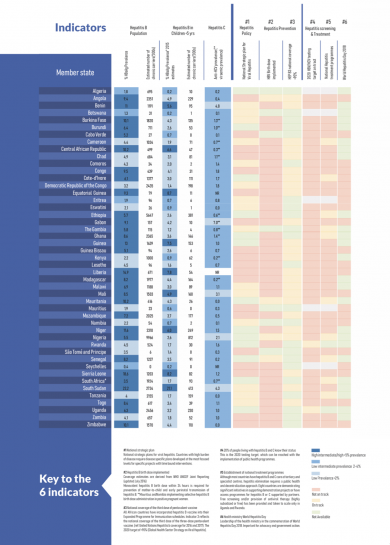
Hepatitis Scorecard for the WHO Africa Region Implementing the hepatitis elimination strategy
– A new scorecard – the first to examine hepatitis prevalence and response in the World Health Organization (WHO) African region,
This analysis is the first to track each country in the region and to assess progress towards the goal of saving the lives of more than two million Africans who may develop progressive hepatitis B or C liver disease in the next decade if countries fail to ramp up their efforts. It provides vital information about the status of the regional hepatitis response, measuring progress against the Framework for Action for the Prevention, Care and Treatment of Viral Hepatitis in the African Region (2016–2020). It was created as a guide for Member States on the implementation of the Global Health Sector Strategy on Viral Hepatitis, which calls for the elimination of hepatitis by 2030 (defined as a 90% reduction in new cases and 65% reduction in deaths).
Every year more than 200 000 people in Africa are dying from complications of viral hepatitis B and C-related liver disease, including cirrhosis and liver cancer. Sixty million people - in the WHO Africa Region were living with chronic hepatitis B infection in 2015. More than 4.8 million of them are children under five years old. A further 10 million are infected with hepatitis C, most likely due to unsafe injection practices within health facilities or by communities.
The analysis shows that 28 countries have developed a national hepatitis strategic plan for viral hepatitis; however, most are still in draft form with only 13 officially published and disseminated. WHO has been a major partner in the regional response with policy development and provision of technical and financial support as well as capacity building for a co-ordinated regional response.
7 countries in the region (15%) are leading prevention efforts with national coverage of both Hepatitis B birthdose and childhood pentavalent childhood vaccination exceeding 90%.There are major gaps in hepatitis testing and treatment with less than 8 countries providing subsidized testing and treatment for viral hepatitis. Uganda has started free nationwide hepatitis B treatment, and Rwanda is providing free treatment for both hepatitis B and C. These 2 countries are championing the regional response and are on track to reach the 2020 Framework targets for testing and community awareness.
Administration of the hepatitis B vaccination at birth and in early infancy is the most effective way to halt the transmission of the virus because 95% of the burden of chronic disease is due to infections among children acquired before their fifth birthday, including mother-to-child transmission. In spite of the low cost of birth dose vaccination – less than US$ 0.20 per child – only 11 countries in the region are following this protocol. One such country is Cabo Verde where the government has mobilized financial resources and has achieved 99% vaccination coverage at birth.
The scorecard was presented at the first African Hepatitis Summit in Kampala, Uganda from June 18 – 20.


